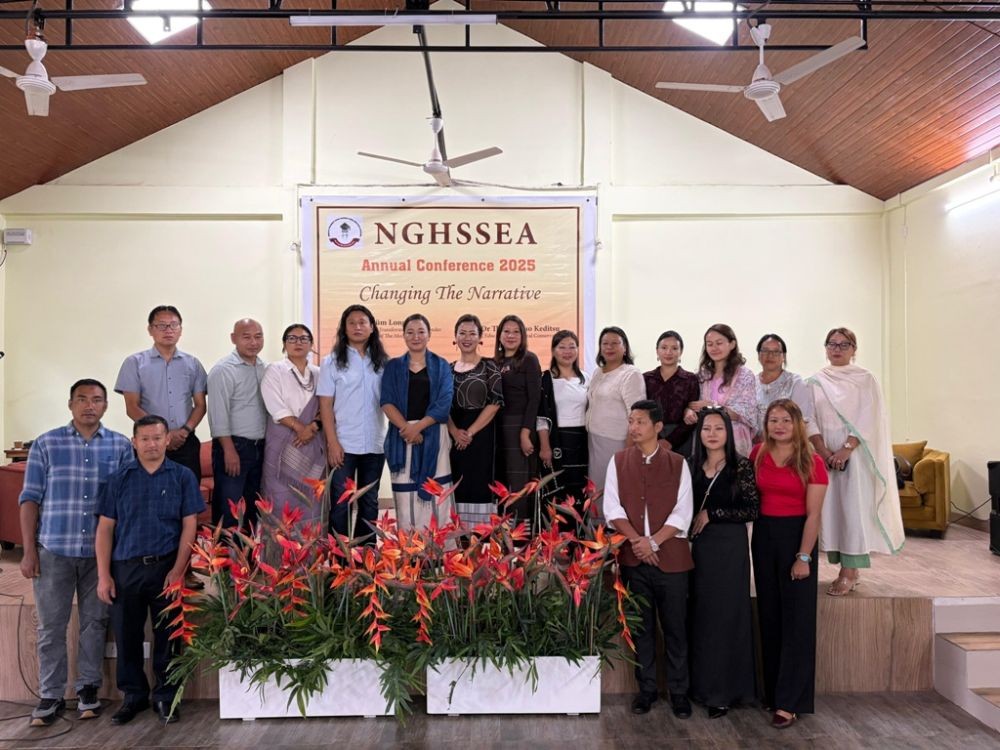
Morung Express News
Dimapur | November 1
Education in Nagaland requires a “fundamental paradigm shift” to become a genuine catalyst for social transformation, Dr Aküm Longchari, student in Conflict Transformation, Co-founder and publisher of The Morung Express said on Saturday, calling for reforms that move beyond degree-driven learning to value-based and community-centred education.
Speaking on “Education as a Catalyst for Social Change” at the Nagaland Government Higher Secondary School Employees Association (NGHSSEA) seminar commemorating its Annual Conference at Aiko Conference Hall, Dimapur, Longchari said education in the state is at a “critical juncture,” arguing that outdated systems and inherited colonial structures continue to shape knowledge, behaviour and power relations.
“We are capable of birthing the new, but we must ask why it is not being born,” he said, urging educators to rethink how schools prepare young citizens for rapid global changes and emerging societal challenges.
Longchari stressed that education should empower students to become “free and conscious beings” capable of questioning the status quo, rather than conditioning them to comply. “If education is designed to limit imagination and suppress critical spirit, what then is its purpose?” he remarked.
Calls for re-examining curriculum
Longchari emphasised the need to critically assess the taught, hidden and missing curriculum in schools.
The hidden curriculum, he said, often encourages conformity and discourages independent thinking.
The missing curriculum includes historical and social realities that are excluded from classrooms, limiting political and civic consciousness.
To drive change, he proposed rediscovering traditional Naga learning values rooted in truth, morality and skill; and aligning with global frameworks such as UNESCO’s four pillars of education- learning to be, to know, to do and to live together.
Longchari stressed that teachers are central to shaping a just and inclusive society by nurturing critical thinking, empathy and civic responsibility.
“Teachers do not merely educate minds, they nurture citizens,” he said, adding that schools must become “ecologies of human experience” where diversity and dialogue are celebrated. He noted that technology, social media and artificial intelligence risk “mechanising” students, and urged educators to balance modern tools with human values.
Longchari shared inputs from teachers, who emphasised promoting critical thinking over rote learning, strengthening student identity and confidence, bridging tradition and modernity, addressing gender-based violence and social issues in schools, ensuring autonomy and community participation in school governance. Teachers also highlighted challenges posed by increased parental pressure and social media influence.
‘Education must form citizens, not spectators’
Invoking classical definitions of citizenship, he said societies transform only when education builds citizens capable of imagining and creating the new. “A teacher should be able to say, come and witness what I am doing,” he noted.
Calling for a decolonising and humanising educational approach, he said Nagaland must re-embed truth, morality and community wisdom into learning systems while embracing scientific temper and progressive outlook.
Expressing appreciation to the NGHSSEA for fostering dialogue, he said the conversation should inspire a sustained process of reflection and collective action. “We need stories and systems that allow the new to be born,” he said. “Education must cultivate the heart and mind so that renewal and regeneration become possible in our society.”
Reclaim language, rethink AI: Dr Keditsu
Poet, educator and cultural conservationist Dr Theyiesinuo Keditsu has called for reimagining government school education by drawing from indigenous knowledge systems, reclaiming language and critically engaging with emerging technologies such as Artificial Intelligence (AI).
Delivering a talk on “Reimagining the Government School Story,” Dr Keditsu traced the history of India’s education system to the colonial period, noting that Thomas Macaulay’s Minute on Education (1835) sought to create subjects “Indian in blood, but English in taste and intellect.” She said the colonial system aimed at producing obedience rather than imagination, replacing oral and community-based learning in regions like Nagaland.
On language, she drew from writers Ngũgĩ wa Thiong’o and Homi K. Bhabha to highlight how English became both an aspiration and a burden. Many Nagas speak the language fluently yet uneasily, she observed, urging learners to reclaim it with authenticity. “Do we use English, or does it use us?” she asked.
Calling AI a new form of colonisation, she cautioned against over-reliance on technology in classrooms. Narrating an incident where a student unknowingly read an AI prompt aloud, she said such dependence risks weakening critical thinking and creativity among teachers and students.
Dr Keditsu said the National Education Policy (NEP) 2020 provides an opportunity to revive experiential learning, integrate arts and crafts, use local languages and promote teacher autonomy—practices rooted in indigenous systems where learning occurred through observation, practice and storytelling.
She added that inadequate infrastructure in government schools can be turned into strength by linking learning with the land and community. Concluding her address, she urged educators to “teach as humans again” by thinking slowly, speaking authentically and grounding education in culture and lived experience.






